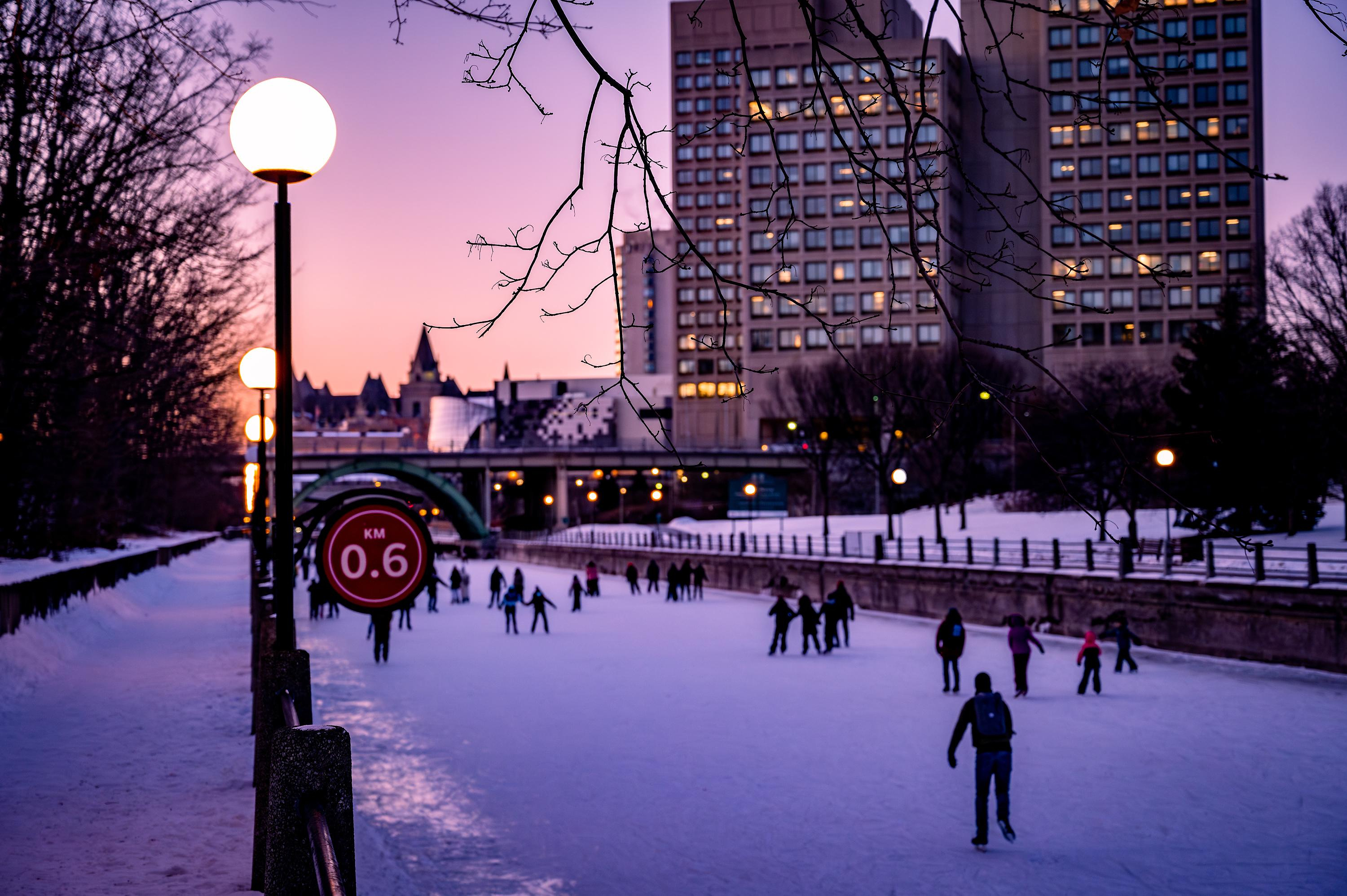This article is taken from the special issue of Le Figaro “D’Est en Ouest – Vivre au Canada”, available on the Figaro Store.
Ontario is home to the famous Niagara Falls, vast forests, great lakes and its two main cities, Toronto and Ottawa. The largest metropolis in the province, of which it is the capital, Toronto is both the most populous city in Canada and its financial center. More than half of the population comes from a foreign country, making it the most multicultural city in the world. It is also known for being very secure and clean, hence its popularity with immigrants. 80% of newcomers to Ontario choose to settle in Toronto.
Smaller, the city of Ottawa has the advantage for French speakers of being located just ten minutes from the Quebec border. You can therefore work there while living in Quebec, and vice versa. The federal capital is also renowned for its quality of life, with the largest cross-country ski area in North America just a stone's throw from the center, in Gatineau Park, more than 4,300 hectares of green spaces, seven national museums, French-language educational establishments, including the Paul-Claudel French high school. Ontario is also very well equipped with French or bilingual schools. From 4 to 18 years old, French-speaking children have access to free education in French or English and can then continue their studies in one of nine bilingual or French-speaking universities, including the Université de l'Ontario français in Toronto. , open in 2021.
Ontario's only problem: the cost of living. If the average annual salary of Ontarians is one of the highest in Canada, it adapts to the cost of living in the province. According to the Canadian Real Estate Association, the average price of one is $686,371 CAD across Canada, $471,460 CAD in Quebec, and $960,967 CAD in British Columbia. The latter and Ontario have the most expensive housing markets in Canada.
Most Francophones choose to live in Eastern (43.1%) and Northeastern (19.7%) of Ontario. 30% live in the Champlain region. Nevertheless, although the number of French speakers remains relatively stable, the proportion of French speakers (first official language spoken), compared to the general population, increased from 3.8% in 2016 to 3.4% in 2021, the highest sharp decline since 2001. In Greater Sudbury, nearly 23% of residents have French as their first official language spoken, compared to 26% in 2016, according to Statistics Canada. In Ottawa, only 15% of the population has French as their first language. The town of Hearst, in the north of the province, has the largest number of French-speaking citizens: 86%, compared to 93% in 2016. However, the implementation of the Express Entry program in 2015 is starting to bear fruit since the Ontario reached its target of 5% French-speaking immigrants in 2022 for the first time in eight years.
Good news for prospective immigrants to Ontario! The provincial government has decided to double the number of economic immigrants it will welcome in 2025, in order to remedy the labor shortage. With nearly 300,000 jobs going unfilled every day, this measure will allow Ontario to select more of the workers needed in sectors such as skilled trades, technology and health care. The quota of designations allocated to the province by the federal government should therefore increase from 9,000 in 2021 to 18,361 in 2025. In 2023, the province will be able to designate 16,500 immigrants.
To more easily attract immigrants, the province has also lifted certain discriminatory barriers such as the need to have Canadian experience to obtain a license in a certain number of regulated professions.
Designed by the Réseau en immigration francophone du Centre-Sud-Ouest de l’Ontario (RIFCSO), GuideMoi is a free mobile application dedicated specifically to French-speaking immigrants who wish to settle or have just settled in Ontario. She supports and guides new arrivals throughout their integration process, from their immigration project to obtaining their citizenship. There they find an interactive map of all French-language services in Central Southwestern Ontario, a list of tasks to carry out based on their place in the Francophone integration journey, notifications to stay informed of important news and articles on specific topics such as education, daily life or law. Free on Google Play and App Store.
The Center francophone du Grand Toronto (CFGT or the Franco Center) offers various services to the entire French-speaking community: free legal aid, support in job searches, resources for finding housing, support for families in the school search process and in the registration process… It is also an opportunity to meet new people thanks to the numerous activities organized such as parent-toddler workshops or conversation circles. www.centrefranco.org

 B:SM will break its investment record this year with 62 million euros
B:SM will break its investment record this year with 62 million euros War in Ukraine: when kyiv attacks Russia with inflatable balloons loaded with explosives
War in Ukraine: when kyiv attacks Russia with inflatable balloons loaded with explosives United States: divided on the question of presidential immunity, the Supreme Court offers respite to Trump
United States: divided on the question of presidential immunity, the Supreme Court offers respite to Trump Maurizio Molinari: “the Scurati affair, a European injury”
Maurizio Molinari: “the Scurati affair, a European injury” Irritable bowel syndrome: the effectiveness of low-carbohydrate diets is confirmed
Irritable bowel syndrome: the effectiveness of low-carbohydrate diets is confirmed Beware of the three main sources of poisoning in children
Beware of the three main sources of poisoning in children First three cases of “native” cholera confirmed in Mayotte
First three cases of “native” cholera confirmed in Mayotte Meningitis: compulsory vaccination for babies will be extended in 2025
Meningitis: compulsory vaccination for babies will be extended in 2025 Thanks to intelligent cameras, RATP will indicate the least crowded trains on line 14
Thanks to intelligent cameras, RATP will indicate the least crowded trains on line 14 Dubai begins the transformation of Al-Maktoum to make it the future “largest airport in the world”
Dubai begins the transformation of Al-Maktoum to make it the future “largest airport in the world” When traveling abroad, money is a source of stress for seven out of ten French people
When traveling abroad, money is a source of stress for seven out of ten French people Elon Musk arrives in China to negotiate data transfer and deployment of Tesla autopilot
Elon Musk arrives in China to negotiate data transfer and deployment of Tesla autopilot Two people arrested for attempted damage to classified property at the Musée d’Orsay
Two people arrested for attempted damage to classified property at the Musée d’Orsay Death of composer Jean Musy, at 76, author of the music of Papy fait de la resistance, Les Champs-Élysées
Death of composer Jean Musy, at 76, author of the music of Papy fait de la resistance, Les Champs-Élysées Fanny Ardant prodigious in The Wound and the Thirst
Fanny Ardant prodigious in The Wound and the Thirst Hospitalized for pneumonia, Véronique Sanson cancels her concert in Nantes
Hospitalized for pneumonia, Véronique Sanson cancels her concert in Nantes Skoda Kodiaq 2024: a 'beast' plug-in hybrid SUV
Skoda Kodiaq 2024: a 'beast' plug-in hybrid SUV Tesla launches a new Model Y with 600 km of autonomy at a "more accessible price"
Tesla launches a new Model Y with 600 km of autonomy at a "more accessible price" The 10 best-selling cars in March 2024 in Spain: sales fall due to Easter
The 10 best-selling cars in March 2024 in Spain: sales fall due to Easter A private jet company buys more than 100 flying cars
A private jet company buys more than 100 flying cars This is how housing prices have changed in Spain in the last decade
This is how housing prices have changed in Spain in the last decade The home mortgage firm drops 10% in January and interest soars to 3.46%
The home mortgage firm drops 10% in January and interest soars to 3.46% The jewel of the Rocío de Nagüeles urbanization: a dream villa in Marbella
The jewel of the Rocío de Nagüeles urbanization: a dream villa in Marbella Rental prices grow by 7.3% in February: where does it go up and where does it go down?
Rental prices grow by 7.3% in February: where does it go up and where does it go down? Europeans: a senior official on the National Rally list
Europeans: a senior official on the National Rally list Blockade of Sciences Po: the right denounces a “drift”, the government charges the rebels
Blockade of Sciences Po: the right denounces a “drift”, the government charges the rebels Even on a mission for NATO, the Charles-de-Gaulle remains under French control, Lecornu responds to Mélenchon
Even on a mission for NATO, the Charles-de-Gaulle remains under French control, Lecornu responds to Mélenchon “Deadly Europe”, “economic decline”, immigration… What to remember from Emmanuel Macron’s speech at the Sorbonne
“Deadly Europe”, “economic decline”, immigration… What to remember from Emmanuel Macron’s speech at the Sorbonne These French cities that will boycott the World Cup in Qatar
These French cities that will boycott the World Cup in Qatar Mercato: Fonseca coach of AC Milan? The Lille coach speaks
Mercato: Fonseca coach of AC Milan? The Lille coach speaks Ligue 1: OM with a three-way defense, Lens changes almost nothing
Ligue 1: OM with a three-way defense, Lens changes almost nothing Ligue 1: PSG officially crowned champion of France for the 12th time
Ligue 1: PSG officially crowned champion of France for the 12th time Ligue 1: Lyon offers Monaco and gets closer to a European place
Ligue 1: Lyon offers Monaco and gets closer to a European place

















